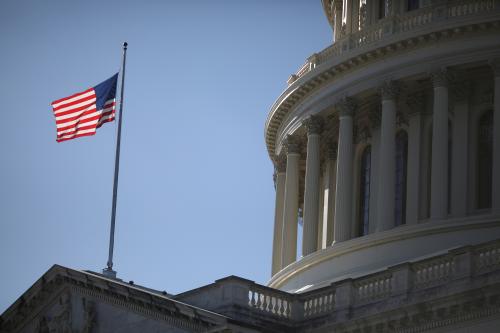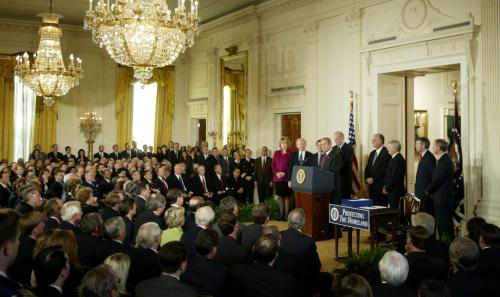 In a recent survey, 93% of Americans ages 30 and above said they can remember exactly where they were or what they were doing the moment they learned of the terrorist attacks on September 11, 2001. During the past six decades, only the Kennedy assassination had such a pervasive and enduring impact. It is hardly surprising, then, that in 2016, more than three-quarters of American adults named 9/11 as a top historical event of their lives, nearly twice as many as for the second most-cited event.
In a recent survey, 93% of Americans ages 30 and above said they can remember exactly where they were or what they were doing the moment they learned of the terrorist attacks on September 11, 2001. During the past six decades, only the Kennedy assassination had such a pervasive and enduring impact. It is hardly surprising, then, that in 2016, more than three-quarters of American adults named 9/11 as a top historical event of their lives, nearly twice as many as for the second most-cited event.
There is no evidence that this sentiment has faded during the past five years. A survey released earlier this month found 64% of Americans—the highest share ever—said that 9/11 has permanently changed the way we live our lives. Significant minorities are less willing to take flights, go into skyscrapers, attend mass events, or travel overseas than they were before 9/11.
Many Americans’ views of Islam have also undergone long-term change. In March of 2002, 25% of Americans, including 23% of Democrats and 32% of Republicans, believed that Islam is more likely to encourage violence among its followers than are other religions. Today, the share of Americans endorsing this view has doubled to 50%, but unlike two decades ago, it has divided the parties. Seventy-two percent of Republicans (up 40 points since 2002) now see an intense link between Islam and violence, compared with 32% of Democrats. These sentiments go a long way toward explaining why Donald Trump’s mistrust of Muslims played so well among his supporters—and why so many Democrats reacted with fury to Mr. Trump’s restrictions on travel from Muslim countries early in his administration.
Under George W. Bush’s leadership, the United States responded to the 9/11 attacks by launching a “war on terror,” beginning in Afghanistan, where al-Qaeda’s plot was conceived and organized. While this military venture and the subsequent invasion of Afghanistan initially enjoyed strong public backing, support eroded as the wars on the ground went on longer than expected. After the killing of Osama bin Laden in 2011, 56% of Americans said they now supported withdrawing our troops from Afghanistan.
It took another decade, spanning three presidents, to honor their wishes. No wonder the phrase “endless wars” became commonplace across party lines. And the way the war in Afghanistan finally ended intensified public discontent. Seven in ten Americans believe that we failed to achieve our goals in Afghanistan—a somewhat smaller majority says the same about the invasion of Iraq. Only 8% of Americans say that the withdrawal from Afghanistan has made us safer from terrorism, compared to 44% who say that it has made us less safe. We will never know whether Americans would have a more optimistic assessment if the withdrawal had been less abrupt and better organized.
The negative judgments about the invasion of Afghanistan are part of a broader reevaluation of the impact of 9/11 over the past two decades. On the one-year anniversary of the terrorist attacks, Americans thought, by a margin of two to one, that these events had changed the United States for the better. On the 10th anniversary, the evaluation had turned negative, and on the 20th anniversary, even more so.
Table 1: Percentage of Americans who say that 9/11 has changed America…
| For the better | For the worse | |
| Sept. 2002 | 55% | 27% |
| Sept. 2011 | 39% | 42% |
| Sept. 2021 | 33% | 46% |
| Source: Washington Post-ABC News Poll; Aug. 29 – Sept. 1, 2021 | ||
Similarly, earlier judgments that our response to 9/11 had made us safer against future terrorist attacks have become more ambivalent.
Table 2: Compared to the situation before September 11, 2001, do you think the country today is safer or less safe from terrorism?
| Safer | Less Safe | |
| 2003 | 67% | 27% |
| 2011 | 64% | 25% |
| 2021 | 49% | 41% |
| Source: Washington Post-ABC News Poll; Aug. 29 – Sept. 1, 2021 | ||
Another recent survey found even more negative results, with just 30% believing that we are now safer than before 9/11, compared to 44% who think we are less safe.
For now, at least, the 9/11 attacks and their aftermath have left Americans more fearful at home, more negative about the impact of leaders’ decisions over the past two decades, and less willing to deploy American ground forces in lengthy combat abroad. The next few years will reveal whether these sentiments will exacerbate public discontent at home and trigger a broader American retreat from the world or crystallize Americans’ determination to regain lost ground, as happened in the years after our ignominious retreat from Vietnam.
The Brookings Institution is committed to quality, independence, and impact.
We are supported by a diverse array of funders. In line with our values and policies, each Brookings publication represents the sole views of its author(s).








Commentary
Twenty years later, how Americans assess the effects of the 9/11 attacks
September 9, 2021